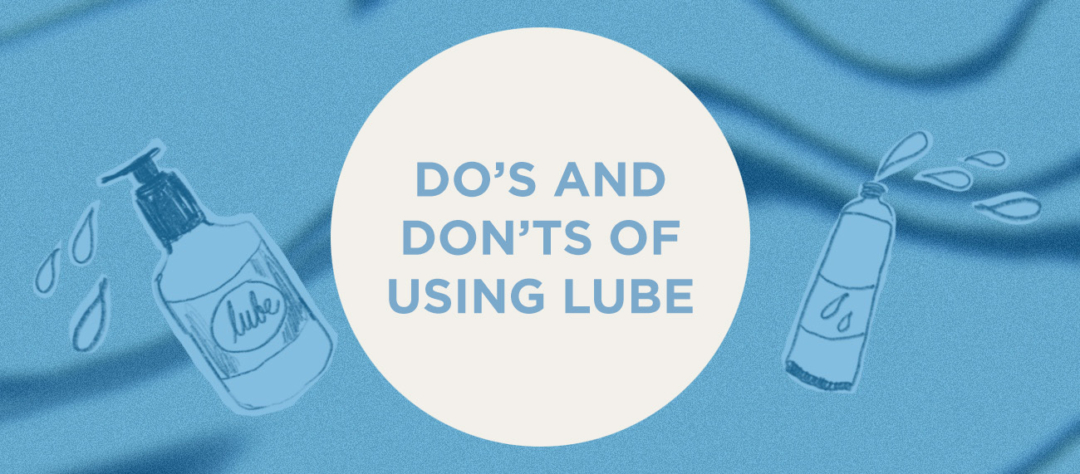Using lube in the bedroom can be both exciting and enjoyable, but there are some important do’s and don’ts to bear in mind before inviting this new guest into your life. Let’s break down the key things to remember when using lube…
There are three main types of lube – water based, silicone based and oil based – and which one you reach for can be dependent on the scenario. At the same time, it’s important to know that this type of lube you use can affect more than just your pleasure.
Do look for fertility-friendly lube when trying to get pregnant
Some highstreet lubes have been shown to impact sperm’s ability to swim, so if you or your partner are looking to get pregnant, you may want to instead look for a fertility-friendly lube.
Despite this, lubricant is not a contraceptive and cannot protect you against pregnancies or sexually transmitted infections. Even if you are using a regular form of contraception like Hana®, you will not be protected against sexually transmitted infections and you may want to use a condom.
Do use protection
As mentioned, lube does not help to protect against pregnancies or sexually transmitted infections. If you are looking for a reliable, regular form of birth control, why not try Hana®? Hana® is a progestogen only pill containing desogestrel, and is over 99% effective when taken correctly. Learn more at https://www.hana.co.uk/what-is-hana/
Do use as much as you want!
When using lube, it’s all about what is comfortable for you! Don’t be shy to add a few extra squirts if you feel like it. Experiment with what feels good and when you may need more or less. For example, while vaginal and oral sex both supply natural lubrication, we recommend using more lube during anal sex due to the lack of self lubrication.
Do place a towel underneath to protect from stains
Lube, like any other liquid, can be messy and using it in the bedroom could lead to some unwanted marks or stains on your sheets. This can easily be prevented by placing down a towel, old t-shirt or blanket before the fun begins.
Do plan ahead
Consider your before, during and after.
Make sure you are prepared in advance and that you and your partner/s are comfortable at all times.
As we’ve mentioned, lube can be a bit messy so it can be a good idea to plan your tidy up in advance.
Top tip: use the bathroom as soon as possible to help avoid a urinary tract infection (UTI)!
Do experiment!
Having sex is all about having fun! Using lube can be done in so many different ways. You can even use it to give a massage. Lube can be great for shower sex, as the shower water works to ‘wash away’ your natural lubricant.
As we briefly touched on, lube can be a bit of a necessity during anal sex and you should always use more than you think you need.
But you can also add lube into your foreplay routine; try it out with toys and oral or hand sex, and even during solo sex.
There are no real ‘rights’ or ‘wrongs’ when using lube, and there are endless possibilities, so it can be fun to experiment and find out what works best for you.
Don’t use silicone-based lubricants with silicone-based sex toys
Although the matching names may make it seem like they work well together, this could not be further from the truth! Using a silicone based lubricant with silicone toys can cause your toys to degrade over time, especially if they are low quality. When this happens it can cause toys to not only become uncomfortable, but also more difficult to clean and, in turn, more likely to cause infections.
Don’t use oil-based lubricants with condoms
Using lube with condoms can be enjoyable but also is recommended during some forms of intercourse, such as anal sex. Something that may not cross your mind is the relationship between condoms and different lubricants. Using oil-based lubricants or other products such as lotion or vaseline can damage condoms and can cause them to break down. Be sure to double check the packaging on any lube before using it with any condoms.
Don’t use flavoured lubes for vaginal intercourse
Flavoured lubes, as enticing as they might sound, often contain sugar, in the form of glucose, which can disrupt the natural pH of the vagina and can trigger yeast infections.
Don’t use expired lube
As a general rule of thumb, we probably shouldn’t use things that have expired, whether this is out of date food or out of date lube. It’s generally better to be safe than sorry. The chemicals used in lubricants change over time and when expired they could increase the risk of infections such as bacterial vaginosis, or even cause a skin reaction.
Don’t ingest lube
While some lubes may smell quite nice and seem pretty harmless, we don’t recommend purposefully ingesting it. It is natural that some may get in your mouth, but do not fret. Lube, in small unintentional doses, is unlikely to cause any real bodily harm beyond a minor upset stomach. It is, however, important to note that each product varies and there are some lubricants that are suitable for consumption, so make sure to read the ingredients and guidelines beforehand.
Hana® 75µg film-coated tablets contains desogestrel and is an oral contraception for women of child bearing age to prevent pregnancy. Always read the instructions on the package leaflet carefully.


